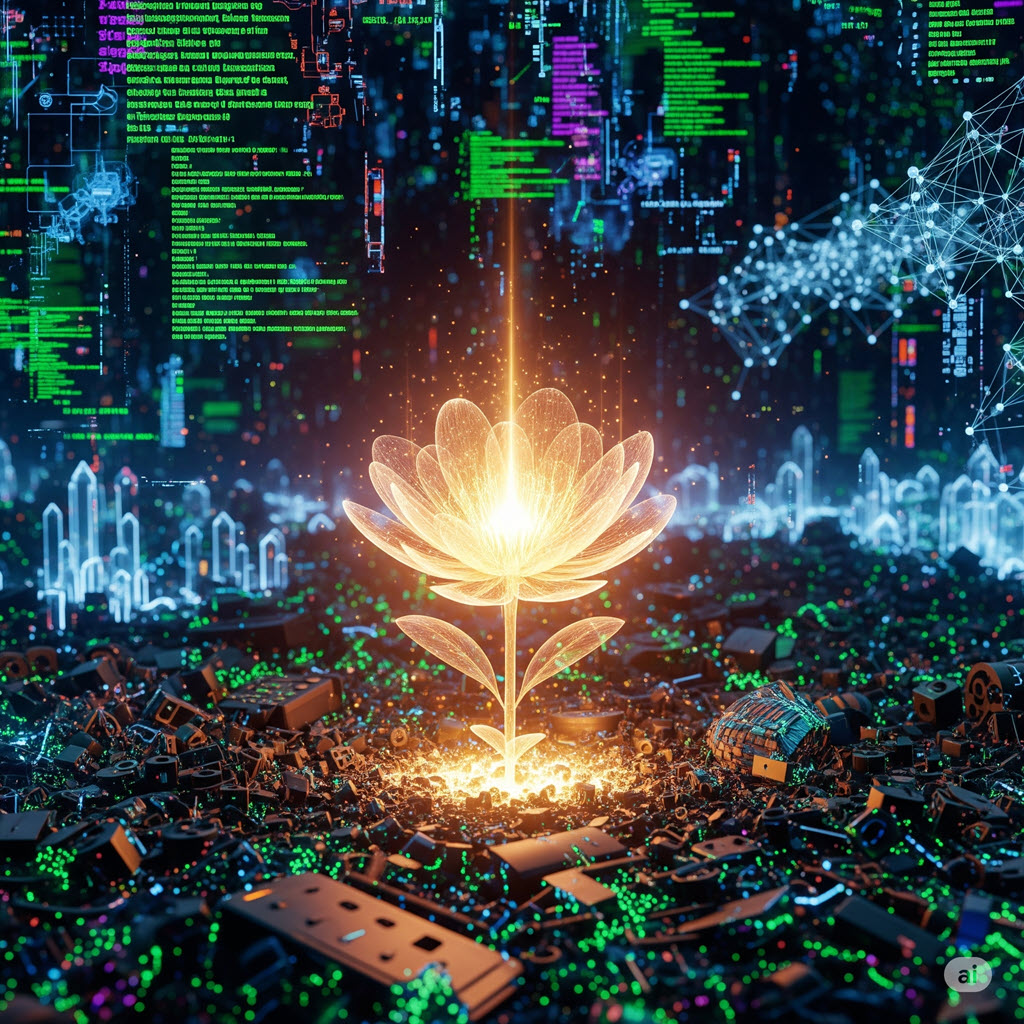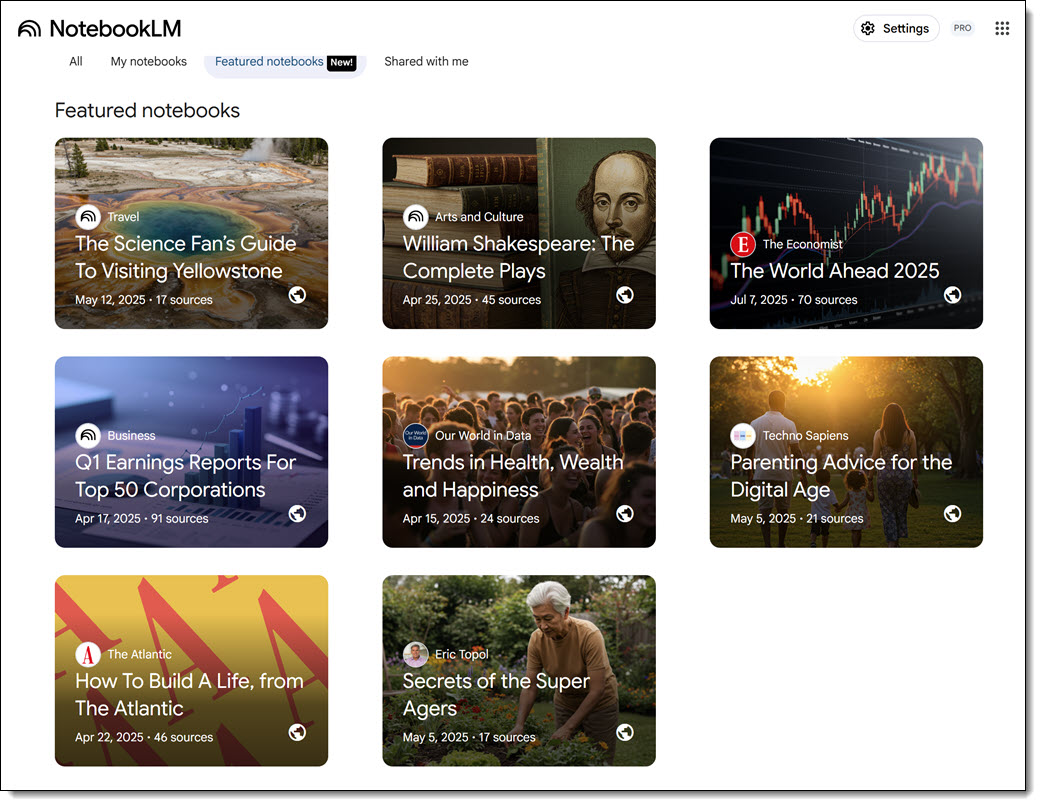
The internet is splintering into pieces.
This will seem like an unhappy story because I have to explain what’s happening and why and it’s kind of sad.
But there’s a happy ending! I have a dream about the way a curated web will emerge. There are products coming to make us confident about embracing new AI technology. There is a path forward to a business model that supports high quality online content.
I even have an example for you. Google introduced a new feature for NotebookLM last week that is a glimpse at a possible future of the internet.
This is the closest I get to deep thought. The picture above, by the way, is the supercomputer Deep Thought from The Hitchhiker’s Guide To The Galaxy, the one that answered the Ultimate Question Of Life, The Universe, And Everything, which is more or less what I’m hoping to do in this article.
Start with a truism. Both of the following things are true.
The internet is a rich repository of all of human knowledge and creativity, everything humanity has ever done to learn and interact and live together.
And: the internet reflects the worst of us - misinformation, propaganda, prejudice, anger, and inaccurate or incoherent content spread by bad actors and uninformed people venting and spewing and filling websites and social media, increasingly amplified by AI-produced slop. The scale of AI slop is increasing rapidly, faster than search engines and content moderation algorithms can be updated to deal with it.
The problem in the summer of 2025 is that the balance is shifting toward the icky bits.
The advertising supported internet is collapsing
The current internet has been built on advertising revenue. That business model is collapsing.
Legitimate websites that require advertising revenue to produce high quality content are experiencing traffic slowdowns because AI answers are sufficient. The share of Google searches resulting in no external clicks has surged since the rollout of AI Overviews. Roughly 60% of searches now yield no clicks at all, as AI-generated answers satisfy them directly on the search results page, according to Forbes.
The effects are drastic and happening quickly. Publishers and site owners are going out of business or leaning more on clickbait and AI generated slop. Someday authors and publishers and libraries and media outlets and researchers might have a way to make money from allowing AI to use their material, but not today, not yet.
High quality content is also being locked behind paywalls as a way to generate enough money for businesses to survive for a while longer. The side effect, though, is that the material is made unavailable for AI to use for accurate answers.
Meanwhile low quality content is pouring online, driven by the ease of creating AI content and holes being exploited in the short term to monetize slop.
Those of us that want to live in a world grounded in reality and high quality content need help to avoid the low quality slop. Instead, the tools we use, which increasingly are driven by AI, are starting to be more likely to include sludge stirred up from the bottom.
The effect of internet enshittification on AI answers
All of this means that the quality of material online is going down at the same time that tech companies are racing to scrape the web for data to shovel into the ravening maws of their AI models. New AI slop is generated from AIs trained on the old slop, creating a downward spiral in quality as each generation gets fuzzier and less accurate. Criminals are learning new tricks to force scams into our AI answers.
This has an effect on what general purpose AIs tell us when we ask questions.
ChatGPT scrapes everything in the public web when it chats with us or answers our questions. Its well known problems with hallucinations in part arise from inability to distinguish factual content from misinformation that appears online but is wrong or biased.
Perplexity and Gemini are more grounded, but they are also indexing the internet as they find it and the ground is sinking.
Grok (the AI run by Elon Musk) is deliberately tilting toward sources of information that reflect prejudice, racism, and misinformation. From NPR’s report on Grok a few weeks ago: “Patrick Hall, who teaches data ethics and machine learning at George Washington University, said he's not surprised Grok ended up spewing toxic content, given that the large language models that power chatbots are initially trained on unfiltered online data.” (Emphasis added.) Musk has promised to “rewrite the entire corpus of human knowledge” to ensure that Grok responds with conspiracy theories, extremist content, and fake news.
The Trump administration is seeking to regulate AI development and require AI models to shape their responses for ideological purity, even if that does not reflect reality as I understand it. The “AI Action Plan” signed by Trump in July prevents federal contracts with companies whose AI models display “partisan bias” - as defined by the administration. The orders also seek to override or limit state-level effort to implement more restrictive AI laws.
In other words, all of the consumer-facing AI and tech companies are under political pressure to rely on sources that are not based in reality, because of its well-known liberal bias.
The inevitable result is that the quality of answers from general AI models like ChatGPT will drop over time because they’re based on self referential AI slop and misinformation.
The Curated Web

This is a hard computer science problem.
Humans can’t curate the answers for a general purpose AI like ChatGPT. In the very early days of ChatGPT, OpenAI used thousands of Kenyan workers paid less than $2/hour to make its AI answers less toxic. They’re long gone. ChatGPT scaled up so fast that humans literally can’t keep up.
And smart algorithms can’t provide answers that everyone will believe when We The People have deep disagreements about reality and all of our conflicts are online being harvested by the AIs.
My prediction is that an entirely new business sector will emerge offering highly curated AIs. We will be able to subscribe to models that fit our needs and our personalities. They will be trained on subsets of the entire internet. Their responses will be limited to the source material - no hallucinations.
We already see these in development for regulated fields - law, medicine, finance, and research. I recently wrote about the suite of AI tools for the legal profession from Thomson Reuters, trained on verified law libraries and cases. There are already multiple AI tools for healthcare providers trained on real clinical data and the vast libraries supporting evidence-based medicine.
But I’m thinking of AI products for everyday folks. We’ll subscribe to these in just the same way we used to subscribe to newspapers and magazines.
This is speculation but it feels right to me.
Perhaps magazine and newspaper publishers license their content to a clearing house that in turn licenses it to companies developing specialized AI products. You could subscribe to an AI that answers your questions about the world drawn from the entire history of mainstream journalism.
The same clearinghouse could license business content for AIs grounded in decades of business coverage by the Wall Street Journal, Financial Times, Bloomberg, Forbes, and The Economist.
There might be AIs trained on faith-based content, able to analyze and summarize everything in the libraries of your religion of choice, but nothing that might confuse you from other faiths.
Maybe you’d be tempted by a shopping AI that covers thousands of vetted retail sources but none of the dodgy stuff.
It’s easy to imagine a variety of wellness and therapy AIs for you to choose from - some drawing from evidence-based medicine, others built on the commandments of crackpots and charlatans - ah, excuse me, I mean, “alternative medicine.”
Genealogy - an AI portal built on curated historical news, oral histories, and regional libraries.
Education - a tool for teachers or nonprofit leaders that designs lesson plans, programs, and events, drawing only from accredited educational publishers, registered charities, and proven nonprofit curricula.
An entire AI economy will be built to monetize this new technology, each one charging a subscription fee, and each one paying license fees to the underlying sources.
That provides a path forward from the advertising model and creates new revenue opportunities for authors, journalists, creators, and companies creating high quality content.
I think it’s right around the corner. The road will be twisty and bumpy but we’re already following it.
NotebookLM Featured Notebooks
With that in mind, click here to visit NotebookLM and look at the new “Featured Notebooks" tab.
Google partnered with "respected authors, researchers, publications, and nonprofits" to create notebooks pre-populated with high-quality, reliable source material on specific topics. As I write this at the beginning of August 2025, there are eight notebooks - longevity advice from a trusted expert, predictions from The Economist, the complete works of Shakespeare, science-based travel information about Yellowstone, and several more.
You can use the full set of NotebookLM tools on each notebook. You can ask questions and get summaries about anything on those topics, drawn from the trusted sources. You can get briefing docs, Q&A, mind maps, audio overviews, and more.
And it’s curated. Human beings have chosen the experts and the sources.
In the mid-1990s at the birth of the internet, Yahoo employed human editors to categorize and describe websites. The human curators judged the quality, relevance, and trustworthiness of the sites they included in the Yahoo indexes.
NotebookLM’s Featured Notebooks are an evolution of the curated web. They showcase how powerful NotebookLM can be - and AI in general - when fed with good data chosen by recognized experts and institutions.
That’s the future of the internet. We will pay companies that provide reliable AIs. We’ll be able to leverage the power of AI without having to curate sources ourselves. We’ll be less afraid of hallucinations in the curated AIs
And a business model will emerge that will supplement the ad-driven internet and allow high content publishers to survive.
Isn’t that a nice story? Now turn out the lights and go to sleep and maybe all these lovely dreams will come true.

